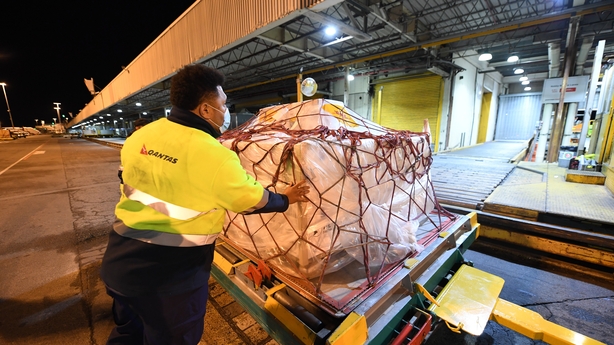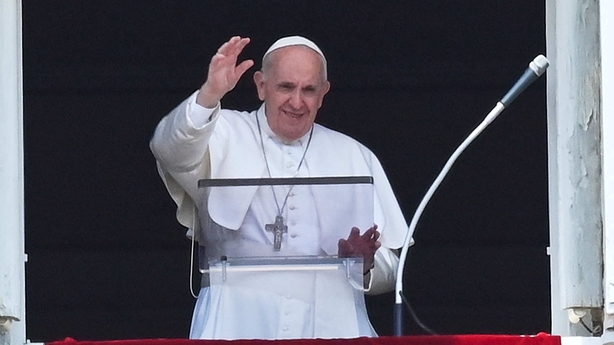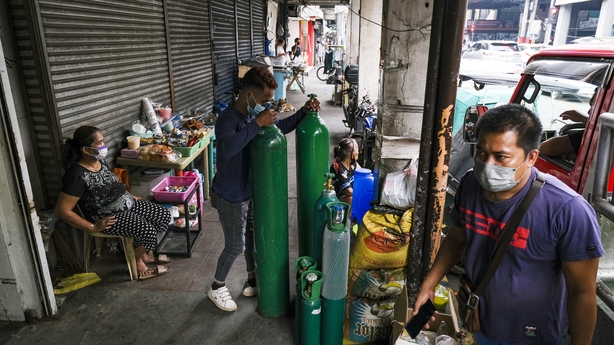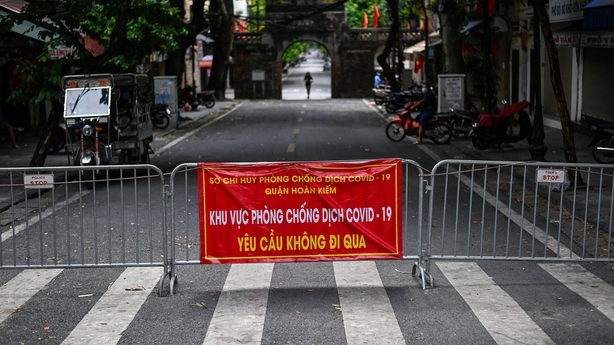The latest Covid-19 restrictions in New Zealand are to be eased, but will remain in place in Auckland, according to Prime Minister Jacinda Ardern as the country battles a Delta variant outbreak.
New Zealand had been largely virus-free, excluding a small cluster of cases in February, until an infected traveller from Australia seeded an outbreak that prompted a national lockdown last week.
Ms Ardern, who said restrictions would be eased outside of Auckland from Wednesday, is continuing to pursue an elimination strategy for the disease.
"We are within sight of elimination, but we can't drop the ball," Ms Ardern said at a televised news conference.
"Day by day we are making very good progress. What I don't want to do is move too quickly and then see a resurgence."
About 1.7 million people in greater Auckland, the epicentre of the outbreak, will remain in a full level 4 lockdown until at least 14 September.
The easing of the alert status to level 2 from level 3 in the rest of the country will allow the reopening of schools, offices and businesses. Regional travel will also be allowed.
Face masks will still be required inside most public venues, including shops and malls. Indoor hospitality venues will be limited to 50 patrons and outdoor venues to 100 people.
Daily new cases in the current outbreak have dropped from a peak of 85 on 29 August to 20 today.
The current outbreak is responsible for 821 of the country's total of about 3,400 Covid-19 cases since the start of the pandemic. It has reported 27 deaths.
Ms Ardern's tough lockdowns and international border closure helped reign in the virus, but the government now faces questions over a delayed vaccine roll-out and rising costs in a country heavily reliant on an immigrant workforce.
Just about 30% of the country's 5.1 million people has been fully vaccinated, the slowest pace among the wealthy nations of the OECD grouping.
Australia cases expected to peak at 2,000 cases daily
Sydney, the epicentre of Australia's biggest coronavirus outbreak, is expected to see daily infections peak next week, authorities said, as they look to speed up immunisations before easing lockdown rules.
Australia is trying to contain a third wave of infections that has hit its two largest cities, Sydney and Melbourne, and its capital Canberra, forcing more than half the country's 25 million people into strict stay-at-home restrictions.
New South Wales Premier Gladys Berejiklian said the government's modelling revealed the state would require its highest number of intensive care beds in early October, with "additional pressure on the system" in the next few weeks.

Daily cases in Sydney's worst-affected suburbs are expected to rise to as high as 2,000 until the middle of this month, the modelling showed.
"If too many of us do the wrong thing, (if) there are too many super-spreading events, we could see those numbers higher," Ms Berejiklian said during a media briefing in Sydney, the state capital.
A total of 1,071 Covid-19 cases are currently in New South Wales hospitals, with 177 people in intensive care, 67 of whom require ventilation.
Officials have said they had quadrupled ICU beds to about 2,000 in the state early last year to handle the pandemic.
The state reported 1,281 new cases today, most of them in Sydney, down from 1,485 a day earlier. Five new deaths were recorded.
Slovakia eases Covid rules for events during pope's visit
Slovakia has widened registration for public events planned during a visit by Pope Francis that begins on Sunday to allow some people not vaccinated against Covid-19 also to attend.
Pope Francis is due to arrive in Slovakia on 12 September for a visit culminating in an open-air mass at the Sastin pilgrimage site in western Slovakia on 15 September.
Around 43% of people in the country of 5.5 million have so far been fully vaccinated or have received their first shot against Covid-19.

The Conference of Slovak Bishops said non-vaccinated people who have tested negative or who have recovered from Covid-19 in the past 180 days would also be allowed to register for the papal events.
Around 30,000 people have so far registered for the mass to celebrate the Feast of Our Lady of Sorrows at Sastin, a site dedicated to the main patron saint of Slovakia.
Several tens of thousands of people usually attend events during a papal visit. A mass in the neighbouring Czech Republic attracted 120,000 in 2009 when Pope Benedict visited.
Pope Francis will be the first pope to visit Slovakia since John Paul II in 2003.
Philippines lifts lockdown in capital as virus surges
The Philippines will lift a stay-at-home order in the capital Manila this week as it trials "granular lockdowns", an official said, in a bid to rein in coronavirus cases and revive the economy.
More than 13 million people in the national capital region - the country's economic heartland - have been in lockdown since 6 August amid record infections.
The move to ease restrictions from Wednesday comes after nationwide daily cases exceeded 20,000 for the past three days - double the number at the start of the latest lockdown - straining hospitals as they grapple with a nurses shortage.
"Localised lockdowns will be piloted in Metro Manila," said presidential spokesman Harry Roque, explaining that a household, building or street could be targeted.
"It will be literally a complete lockdown if you are subject to granular lockdown - even the food will be delivered to you."
There were no further details about how the more targeted measures would be enforced.

The lighter restrictions in the national capital region, which accounts for about a third of the country's economy, will enable many hard-hit businesses to reopen and spur local tourism.
Based on previous guidelines, restaurants will be allowed to accept diners and beauty salons permitted to operate, albeit at reduced capacity.
Limited numbers will be allowed to attend in-person church services.
President Rodrigo Duterte said recently the country could not afford more lockdowns, after previous measures shattered the economy and left millions out of work.
But with only about 19% of the targeted population fully vaccinated and hospitals filling up fast, authorities have had few options to slow the spread of the virus.
The country's infection caseload has passed two million, with over 34,000 deaths.
Vietnam's capital ramps up testing after extending Covid-19 curbs
Vietnam's capital has extended Covid-19 restrictions for a further two weeks, as authorities launched a plan to test up to 1.5 million people for the coronavirus in higher-risk areas of the capital to contain a climb in infections.
The country dealt successfully with the virus for much of the pandemic, but the virulent Delta variant has proved more challenging in recent months.
Hanoi, which has ordered people to stay at home and has halted all non-essential activities since July, has now divided the city into "red", "orange" and "green" zones based on infection risk.
"Accordingly, people in red areas must shelter in place and one person of every household there will be tested three times per week," a statement from city authorities said, adding that in other zones people would be tested every five to seven days.

Barricades separated red zones from other areas, photographs posted on social media and media outlets showed.
Hanoi authorities expect up to 1.5 million test samples to be collected in the next week. The government is eager to keep the outbreak from reaching the intensity seen in Ho Chi Minh City.
In the southern business hub, people have been encouraged to test themselves using antigen kits after health services were overwhelmed.
Hanoi has been reporting on average 50 cases daily and has recorded over 4,000 cases since the pandemic began, official data showed.
Although the numbers are still low, authorities are wary after the Delta variant has helped drive up infections across the country to over 524,000 cases.
One third of Hanoi's 8 million residents have been fully vaccinated and yesterday the health ministry called on the capital and Ho Chi Minh City to vaccinate all adult residents with at least one dose by 15 September.
Vietnam has one of the lowest coronavirus vaccination rates in the region, with only 3.3% of its 98 million people fully vaccinated, and 15.4% with one shot.
Overall death toll could be two to three times higher than official records
The novel coronavirus has killed at least 4,565,622 people since the outbreak emerged in China in December 2019, according to a tally from official sources compiled by AFP at 1000 GMT today.
At least 220,652,860 cases of coronavirus have been registered. The vast majority have recovered, though some have continued to experience symptoms weeks or even months later.
The figures are based on daily reports provided by health authorities in each country.
They exclude revisions made by other statistical organisations, which show that the number of deaths is much higher.
The World Health Organization estimates that the pandemic's overall toll could be two to three times higher than official records, due to the excess mortality that is directly and indirectly linked to Covid-19.
A large number of the less severe or asymptomatic cases also remain undetected, despite intensified testing in many countries.
Yesterday, 6,337 new deaths and 423,848 new cases were recorded worldwide.
Based on latest reports, the countries with the most new deaths were Russia with 790 new deaths, followed by Iran with 610 and United States with 394.
The United States is the worst-affected country with 648,472 deaths from 39,945,106 cases.

